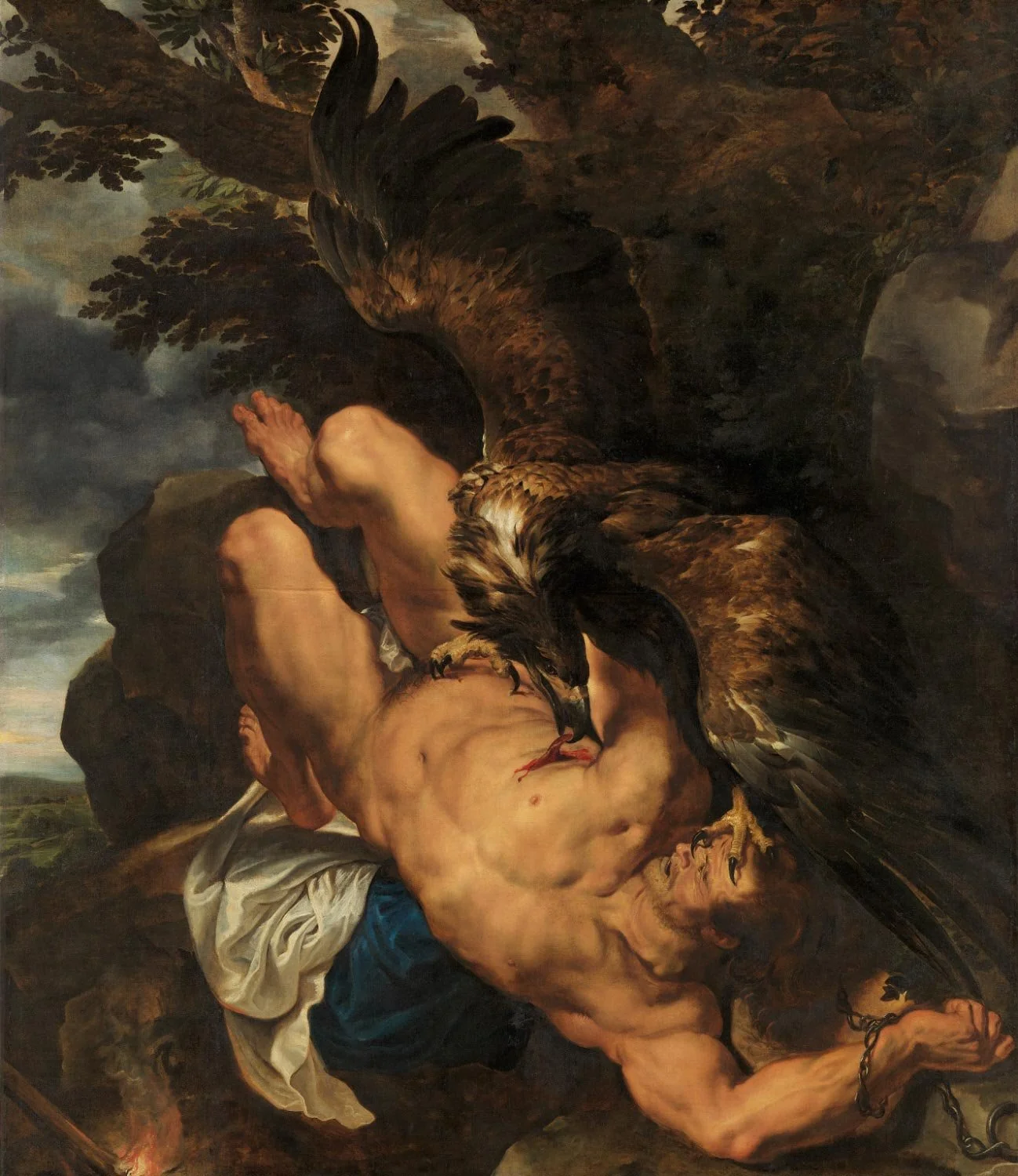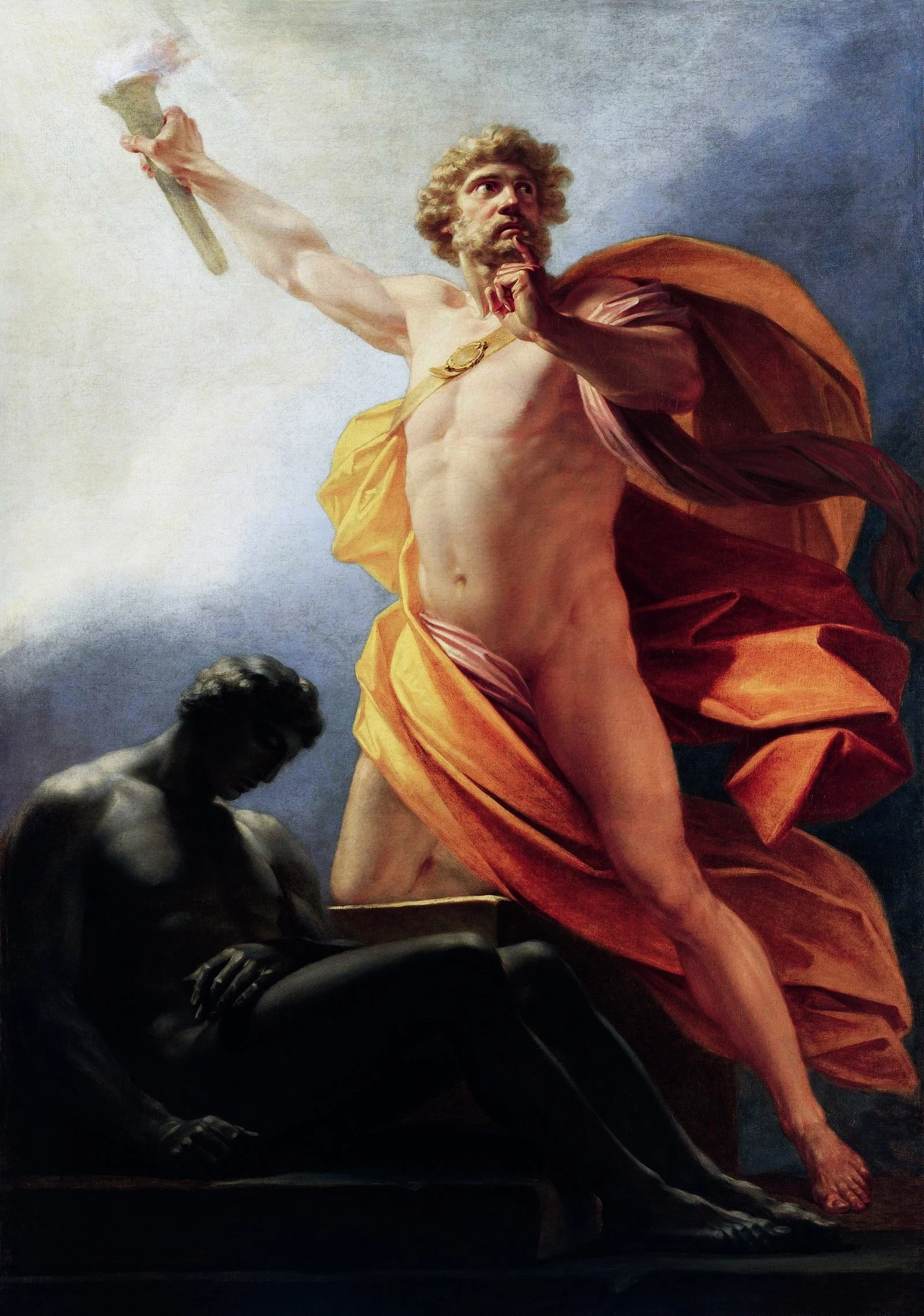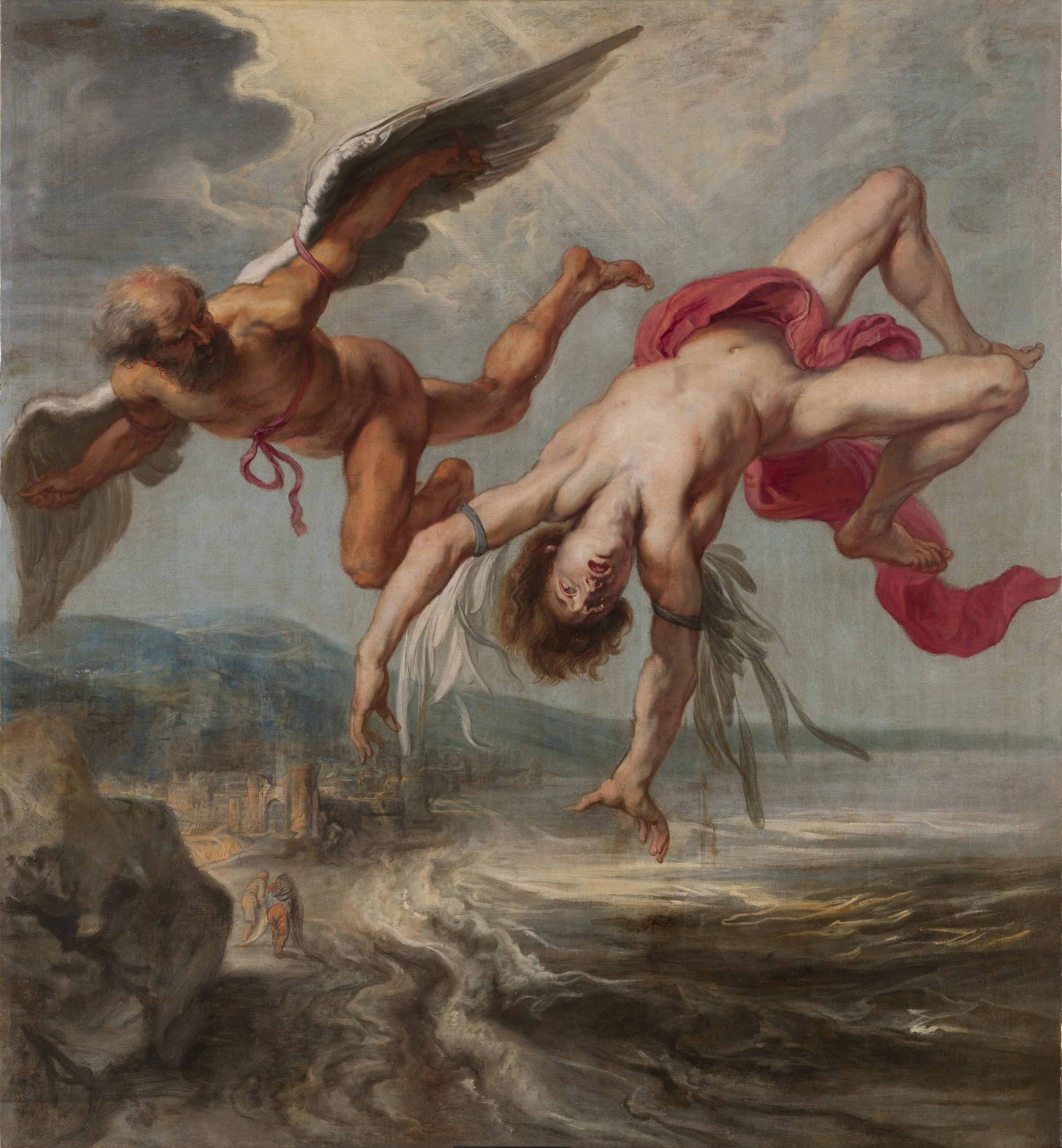The Order of the Fire and Cross: The Promethean Knight
Prometheus Bound-Peter Paul Rubens (1611-1612)
In Greek mythology, Prometheus is famous for bringing fire—a symbol of technology, civilization, and the material arts—to man. Born to the generation of Titans that preceded the rise of the Olympian gods, Prometheus made a deliberate choice to deceive Zeus, who sought to limit the autonomy and freedom of humankind.
During the Trick at Mecone—as described in Hesiod’s Theogony—Prometheus presented Zeus with two offerings. One was a pile of bones dressed in glistening fat; the other, the nourishing meat, was hidden inside the stomach of a slaughtered ox. Zeus, knowing the trick but playing into it to justify future punishment, chose the deceptive pile. Enraged, he withdrew the divine gift of fire from mankind, condemning them to darkness, ignorance, and helplessness.
Moved by compassion for humanity—whom he is also said to have fashioned out of clay—Prometheus defied Zeus once again. He climbed to Olympus and stole fire, hiding it in a fennel stalk, and delivered it back to mankind. With fire came warmth, knowledge, and the seeds of civilization.
But the cost was high. Zeus, in retribution, had Prometheus chained to a rock for all eternity. Each day, an eagle would descend to devour his liver—only for it to regenerate by night, prolonging the torment.
To balance Prometheus's gift of light and reason, Zeus then created Pandora—the first woman. Her beauty was matched by her boundless curiosity. Sent to mankind with a sealed jar (often mistranslated as a box), she opened it, unleashing suffering, temptation, and toil upon the world.
The myth of Prometheus is powerful and timeless. We hear echoes of it in the story of Adam and Eve, whose eating from the Tree of Knowledge leads to the fall of man, divine punishment, and the dawn of the human condition.
The symbolism of fire is especially resonant in Zoroastrian mythology, where followers of Ahura Mazda regard fire as the divine spark—representing illumination, moral awakening, and cosmic dualism. In both traditions, mankind is confronted with a choice: to follow God or the serpent, to pursue good or evil.
There is also a compelling analogy to Lucifer, whose name means light-bearer. His defiance of God led to his exile from heaven. In some Gnostic traditions, both the serpent and Lucifer are reinterpreted not as villains, but as bearers of forbidden wisdom—rebels against tyranny and bringers of enlightenment.
In traditional Christianity, however, it is Christ, not the serpent, who descends to bring divine light. Mystics and theologians have often seen Christ’s incarnation and sacrifice as the sacred act that restored fallen humanity, offering the knowledge of God and the good news of salvation—not through defiance, but through love.
In the 19th century, Romantic poets like Percy Bysshe Shelley and Lord Byron recast Prometheus as a noble figure—a symbol of human intellect and defiant spirit. Shelley’s Prometheus Unbound rewrites Aeschylus’s classic, portraying the Titan as a liberator who refuses to submit: the triumph of heart and reason over dogmatic religion.
Mary Shelley’s Frankenstein offers yet another take: subtitled The Modern Prometheus, the novel explores the dangers of overreaching ambition, hidden knowledge, and the tragic limits of human hubris.
The Promethean spirit has echoed through the ages—and has perhaps never been more relevant. It speaks of rebellion against mediocrity, herd thinking, and the flattening of the soul.
As Nietzsche wrote:
“One must still have chaos in oneself to be able to give birth to a dancing star.”
(Thus Spoke Zarathustra, Prologue 5)
Prometheus Brings Fire to Mankind-Heinrich Friedrich Füger (c.1817)
But alas, unbound fire consumes. It burns everything it touches. This is the danger of unmoored Prometheanism—when the will to rise breaks free from humility and wisdom.
One may recall Robespierre’s hellish ‘Cult of Reason’, or the atheistic hubris of the Bolshevik Revolution, which promised utopia but delivered repression and death. Or Nazi Germany, whose obsession with the mythic Übermensch created an empire built on power without mercy, and will without justice—culminating in monstrous horrors.
As Nietzsche warned:
“Beware that, when fighting monsters, you yourself do not become a monster... for when you gaze long into the abyss, the abyss gazes also into you.”
(Beyond Good and Evil, §146)
The Promethean spirit has echoed through the ages and has never been more relevant. It speaks of rebellion against mediocrity, herd thinking, and the flattening of the soul.
In his book Iranian Leviathan, Jason Reza Jorjani illustrates a history of Promethean defiance in Persian culture—from Zoroastrianism and Mithraism to aspects of Shi’ite Twelver Islam—and advocates embryo selection and genetic engineering to bring back the racial germ of the ancient Indo-Aryans who gave birth to Iranian civilization. Unrestrained transhumanism, the echo of eugenics and the unaccountability and hubris of modern science, are certainly dangers that we are contending with today.
The early Church Fathers, in their great wisdom, understood the threat of an unbridled Prometheanism. As St. Augustine of Hippo taught, true freedom is not the license to follow our passions, but the power to love what is eternal. Without the ordering of loves (what is referred to as ordo amoris), the soul fragments. Without the grace of God, the will becomes a tyrant.
“You have made us for Yourself, O Lord, and our heart is restless until it rests in You.”
— St. Augustine, Confessions, I.1
The image of Icarus, rising into the heavens on winds of hubris is apt. The fire of the sun can lead the way to new horizons, but can also burn the wax from our wings and send us plummeting. What is needed is ordered descent into ourselves and into the peace and mercy of God. What is needed is a new spiritual aristocracy, a vision that remains rooted in love, mercy and Christian virtue while striving for excellence and mastery.
The Fall of Icarus-Jacob Peter Gowy (1635-1637)
The 12th-century monk St. Bernard of Clairvaux railed against the futility and arrogance of European knights embarking on crusade, ostentatiously adorned in their finery. In his Book to the Knights of the Temple, in Praise of the New Knighthood (Liber ad milites templi de laude novae militiae), he writes:
“This worldly knighthood, or rather knavery ... you paint your shields and your saddles; you adorn your bits and spurs with gold and silver and precious stones, and then in all this glory you rush to your ruin with fearful wrath and fearless folly.”
St. Bernard’s words echo the spirit of the First Epistle of Peter:
“Clothe yourselves, all of you, with humility toward one another, for ‘God opposes the proud but gives grace to the humble.’ Humble yourselves, therefore, under the mighty hand of God so that at the proper time he may exalt you.”
(1 Peter 5:5–6)
His admonition — to reject false pride and feigned religiosity — speaks to the eternal truth that true knighthood is found not by indulging the will, but by forging it. Not by conquering others, but by conquering the self. This is the path from Promethean rebel to Christian knight; from fire-bearer to light-bearer in service of the Logos. One takes up the fire — but kneels before the Cross. One ascends in intellect and strength, but only after descending into humility, obedience, and love.
“A new kind of knighthood ... It ceaselessly wages a twofold war both against flesh and blood and against a spiritual army of evil in the heavens. ... He is truly a fearless knight and secure on every side, for his soul is protected by the armor of faith just as his body is protected by armor of steel. He is thus doubly armed and need fear neither demons nor men.”
— St. Bernard of Clairvaux
The world is indeed starved for such men — those who bear the fire of the gods and yet possess the humility of Christ. Men who resist the idols of modernity not with rage, but with discipline and devotion. Men who wrestle with fire, yet are pierced by grace.
We need a new Order.
A Brotherhood.
Men not only of ambition, but of consecrated ambition.
The Order of the Flame and the Cross.
The Order of the Flame and the Cross: Amor Ordinatus Citivas Aeterna (“The City of Eternity is build on Ordered Love”)
For the time is near when the temple must be rebuilt,
when the fire must be guarded,
and when the Cross must shine once more at the heart of the world.



